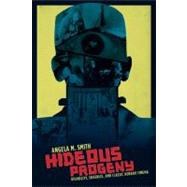Hideous Progeny
, by Smith, Angela M.- ISBN: 9780231157179 | 0231157177
- Cover: Paperback
- Copyright: 11/18/2011
Twisted bodies, deformed faces, aberrant behavior, and abnormal desires characterized the hideous creatures of classic Hollywood horror, which thrilled audiences with their sheer grotesqueness. Most critics have interpreted such traits as symptoms of sexual repression, or as metaphors for other kinds of marginalized identities, but Angela M. Smith conducts a richer investigation into the period's social and cultural preoccupations. Presenting an altogether different reading, she finds in the narrative and spectacle of classic 1930s horror a fascination with eugenics and physical and cognitive debility, heightened by viewers' own desire for visions of vulnerability and transformation. Reading such films as Dracula (1931), Frankenstein (1931), Dr. Jekyll and Mr. Hyde (1931), Freaks (1932), and Mad Love (1935) against early-twentieth-century disability discourse and propaganda on racial and biological purity, Smith reveals classic horror's dependence on the narratives of eugenics and physiognomics. She also notes the genre's conflicted and often contradictory visualizations. Smith ultimately finds in filmmakers' visceral treatments an indictment of biological determinism, taking the impossibility of racial improvement and bodily perfection to sensationalistic heights. By playing up the artifice and conventions of disabled monsters, filmmakers exploited the fears and yearnings of their audience, accentuating both the perversity of the medical and scientific gaze and the debilitating experience of watching horror. Classic horror films therefore encouraged empathy with the disabled monster, offering captive viewers an unsettling encounter with their own impairment. Smith's study has profound implications for cinema and disability studies, not to mention general histories concerning the construction of social and political attitudes toward the other.







